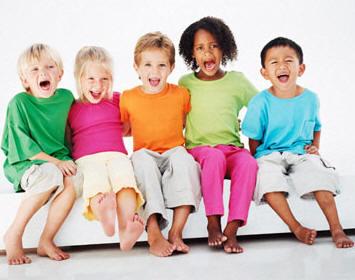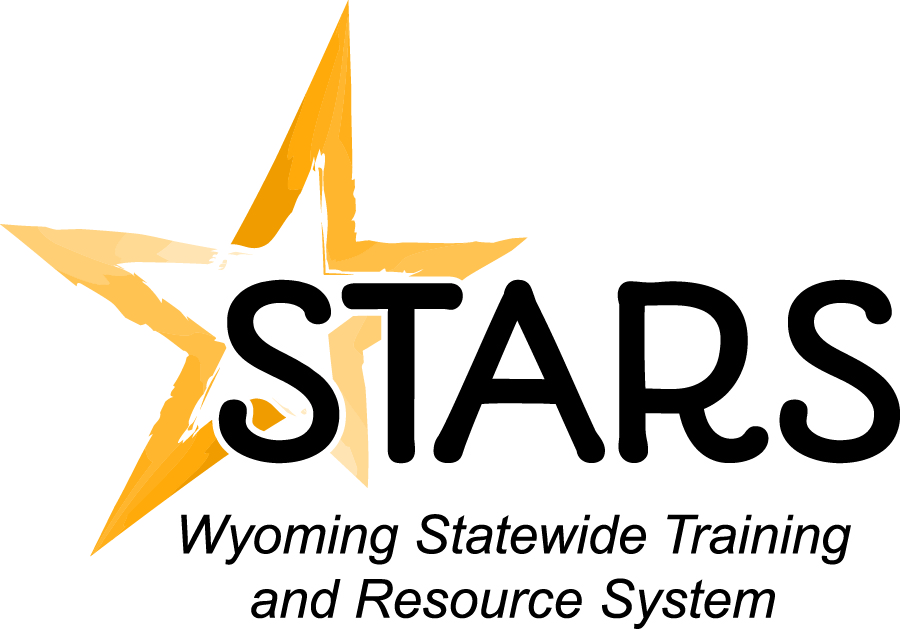Licensed Child Care Providers
The safety and health of the children you will care for is the main focus of Child Care Licensing. This is accomplished through the Wyoming Child Care Licensing Rules.

Considering becoming a Licensed Child Care Provider in Wyoming? Watch this short informational video to get you started! Click here
Who Needs to be Licensed?
If you are caring for more than two children who aren’t related to you, you might have to be licensed. If you do not meet any of the exemption reasons below, then you need to apply for a license. If you do not meet one of the exemptions listed above and are caring for children, you are required by Wyoming law to be licensed. It is considered a crime to operate a child care facility without a license if you are not exempt. If you are not sure whether or not you are exempt from licensing requirements, contact the Child Care Licenser for your county. The exemptions are:
- A legal parent’s or legal relative’s care of a child.
- Occasional care of a neighbor’s or friend’s child if the person providing the care does not regularly engage in the activity.
- Parents exchanging care on a cooperative basis.
- Child care provided by a person employed to come to the home of the child’s parent or guardian.
- Child care facilities providing care for no more than two unrelated children.
- Child care facilities supervised by the state, and local government, school district, agency or political subdivision thereof.
- Ranches or farms not offering services to children who are homeless, delinquent or have an intellectual disability; and
- Summer camps operated by nonprofit organizations;
- Child care facilities providing care to the children of only one (1) immediate family unit;
- After school programs that: (A) Operate primarily when school is not in session including before and after school and during summer months; (B) Exclusively serve children required to attend school under W.S. 21-4-102; (C) Are organized to promote childhood learning, child and youth development, educational, enrichment, recreational or character-building activities; and (D) Adhere to all local applicable health, safety and fire codes or regulations.
Licensing Rules and Types of Child Care Facilites
- Family Child Care Home – to provide care for 3 – 10 children in your own home without additional staff;
- Family Child Care Center – to provide care for a maximum of 15 children in your home or another building in which you do not reside with one additional staff when more than 10 children are present; or
- Child Care Center – to provide care for 16 or more children with adequate staff to meet the staff:child ratio requirements.
- Child Care Licensing Rules
Application & Documents for Child Care Providers
Documents for Child Care Providers
CCL-100 Application for Child Care Certification PDF
CCL-100a Change Request Form Word
CCL-100b Application for Recertification Form Word
CCL-102 Variance Request Word
CCL-200 Initial Inspection Word
CCL-201 Renewal packet Word
CCL-205 Staff Record Summary Word Excel
CCL-209 Renewal Visit (Facility Inspection) Word
CCL-300 Facility Visit Word
CCL-306 Corrective Action Plan Form Word
CCL-605 Wyoming Child Injury Report Word PDF
CCL-607a TB Yearly risk factor self assessment Word PDF
CCL-608 Physician Statement Word
Over the Counter (OTC) Medication Form PDF
Emergency Preparedness
Wyoming Child Care Disaster Response Guidelines and Disaster Plan for Licensed Child Care Facilities
Child Care Crisis Response Guidelines Flip chart Word
Wyoming Emergency Preparedness Plan for All Facilities Click here: PDF
Resource Documents
Resource Documents
Evaluating What you have planned PDF
Child Care Phone Interview PDF
Attendance Sheet PDF
Daily Report Form PDF
Sample policy statement (Parent Handbook)-child care center Word
Sample policy statement (Parent Handbook)-child care home Word
Sample Child's Record Word
Child Record Form PDF
Consent form Word
Consent for Child Care Program Activities PDF
Field Trip Permission Form PDF
Medication Administration Consent PDF
Authorization of Medical Treatment PDF
Daily Menu Production Record PDF
Health Care Plan 2 Word
Special Care Plan PDF
Symptom Record PDF
Child Care Transportation Policy Sample Word
Continuity of Care Plan PDF
Pre-Service & Provider Training
Professional development refers to the ongoing training and education that gives child care providers, directors and staff the knowledge and skills they need to provide high quality early care and education for young children.
The Statewide Training and Resource System (STARS):
STARS approves all training and trainers for licensed child care providers. STARS also awards training credits to the provider after he/she has completed an approved training and maintains a record of completed training for all individuals working in licensed child care facilities.
STARS is able to assist child care providers, directors, and staff with accessing training, printing certificates, and training questions.
Please visit STARS for available on-line training to meet the training requirements listed in Chapter 4, Section 9.
The Department of Family Services contracts with Align to administer these programs. For more information contact the STARS program at 1-800-400-3999 or visit their web site at: http://www.wyregistry.org

All new staff members and directors need a pre-service training that includes:
- Safety and health of Children (emergency preparedness and disaster planning).
- Fire safety (building and physical premises safety).
- Sanitation procedures(handling and storage of hazardous materials).
- First Aid and pediatric & Child and Adult cardiopulmonary resuscitation (including in-person skills demonstration from a certified instructor).
- Medication administration (this topic does not need to be completed if the program does not administer medications).
- Sudden Infant Death Syndrome (SIDS) (this topic does not need to be completed if a program does not provide care to infants).
- Safe sleep practices (this topic does not need to be completed if a program does not provide care to infants).
- Infectious Disease Control (Blood borne pathogens).
- Mandatory reporting ( recognition and reporting of suspected child abuse or neglece).
- Shaken Baby Syndrome (this topic does not need to be completed if a program does not provide care to infants).
- Food allergies (nutrition).
- Transportation safety (this topic does not need to be completed if the program does not transport children for any purpose).
Facility staff orientation to include:
- Facility policies and procedures
- Child Care Licensing Rules
Staff Pre-Service Training and Facility Orientation: All staff prior to assuming responsibility for unsupervised direct care of children or within 3 months of the staff’s start date shall complete the pre-service training and the facility staff orientation.
To meet the 32 training credit requirement in the two (2) year period a combination of the following training shall be completed.
Eight (8) core credits of total training shall include all of the following areas:
- Infectious disease control;
- Fire safety;
- Sanitation;
- Mandatory reporting;
- Safety and health of children;
The following components do not need to be completed if the program does not provide care for infants and/or transport children:
- Sudden Infant Death Syndrome (SIDS);
- Safe Sleep;
- Shaken Baby Syndrome;
- Transportation
Twenty four (24) elective training credits in the area of early learning, early childhood, and/or child development.
All staff shall have Infant Child CPR and First Aid training and certification shall be kept current.
Infant/Toddler training:
- All staff working with infants or toddlers shall complete a minimum of four (4) hours of specialized infant or toddler training every two years.
- Whenever four (4) or more infants are present:
- One (1) staff shall have the Infant/Toddler Director Credential.
- At least one (1) staff person working directly with infants or toddlers shall have a minimum of eight (8) training credits of specialized training in the care of infants or toddlers every two years.
Suspension & Expulsion Resources
Licensing FAQ’s
Licensing FAQ's
An application may be denied if the applicant does not submit the required documentation or complete the required inspections and any compliance necessary. An application may be denied based on any disqualifying information in a Central Registry background check or in the full national fingerprint check. In addition, for reasons stated in the Wyoming Child Care Licensing Rules, Chapter 3, Section 1.
Child Care Licensing staff make a minimum of 2 visits to each facility per year. One visit is unannounced and one visit is scheduled. In addition, visits are made to investigate complaints, provide technical assistance or to conduct compliance monitoring if the facility has had a substantiated complaint.
The child care rules specify that parents or guardians shall be allowed immediate access to their child’s program during the operating hours to see the child or to evaluate the care being provided.
No, child care facilities are not required to administer medication. However, if the provider administers medication, he/or she must have competed the Medication Administration class that is required in the Child Care Licensing Rules. The Child Care Licensing Rules also address procedures that must be followed if medicine is administered which include requirements for documenting when medication is given, having written permission and instructions, and how medications must be stored.
Child Care Licensing Rules require a full national fingerprint criminal background check and Wyoming Central Registry background check revealing no disqualifying information. These checks must be completed on all child care providers, directors, staff, volunteers, substitutes, and household members over the age of 18.
Your local DFS Child Care Licenser may provide you with a copy of each form and the 2 fingerprint cards with the Child Care Application packet. If you need additional copies, you may print the forms from this website: Central Registry site or the Documents for Providers section of this site or contact your Child Care Licenser.
Please see our Professional Development page.
Child Care Provider Café
Registered Exempt Child Care Providers
We are currently developing our Non-licensed Child Care Providers section. While we are in the process of building this section, we encourage you to visit our Contact Us & Locations page and find an office nearest you for the latest information.
Chapter 1 Child Care, Purchase of Service General
Please click here.
State Plans
Child Care and Development Fund (CCDF) Plan for Federal Fiscal Year 2022-2024
Please click here to view the Coronavirus Response and Relief Supplemental Appropriations Act (CRRSAA) & American Rescue Plan Act (ARPA) Child Care Spending Plan. (Updated 12/06/2022)
Please click here to view the Wyoming Department of Family Services Early Care and Education Strategic Plan (11/2023)